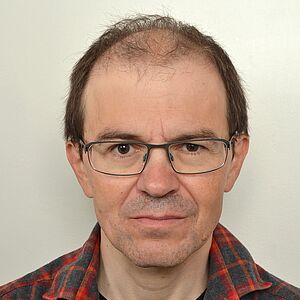
Benoit Fresse
Graduate course "Operads, graph complexes and applications" (Université de Lille, January-March 2025)
Master de mathématiques & Ecole doctorale MADIS 2024-2025 - Université de Lille

Introduction
The archive of this course is available publicly, for free consultation (with a "guest login"/"accès en tant qu'anonyme" allowed), on the moodle site: https://moodle.univ-lille.fr/course/view.php?id=47046
The purpose of this course is to introduce students to current research questions in the domains of algebra and topology.
The first concept that is considered in the course is the notion of an operad. To explain the idea of this notion, an operad is an object that models the structure formed by composites of operations that govern an algebra structure. The usual categories of algebras, e.g. the category of associative algebras, the category of associative and commutative algebras, the category of Lie algebras, … can be associated to operads. There is a notion of presentation by generators and relations for operads, which reflects the classical definition of the structure of an associative algebra, of a commutative algebra, and of a Lie algebra … in terms of a generating operation (a product, a Lie bracket, …) that satisfies a set of relations. In this context, one of the main devices of the theory of operads is the theory of the Koszul duality, which is used to compute the syzygies (the secondary relations) associated to such presentations.
The definition of the classical categories of algebras and of the associated operads is studied in the first part of the course. In a second step, we focus on the study of En-operads: fundamental examples of operads, which are used to model commutativity levels that govern certain algebra structures.
Then we explain a construction of graph complexes with the aim of computing groups of automorphisms associated to En-operads. To conclude the course, we outline applications of graph complexes for the computation of the homotopy of knot spaces/of embedding spaces of manifolds over the rationals.
Prerequisites: fundamental notions of algebra; fundamental notions of algebraic topology (homology and homotopy)
Synopsis
- The classical categories of algebras and the associated operads
- The Koszul duality of algebras. The Koszul duality of operads
- Models of En-operads in topology, algebra, and category theory
- Graph complexes and homotopy automorphisms of En-operads
- Some applications: the operadic interpretation of the Grothendieck-Teichmüller group; the homotopy of knot spaces/of embedding spaces of manifolds
References
- B. Fresse, Homotopy of operads and Grothendieck-Teichmüller groups. Mathematical surveys 272, American Mathematical Society, 2017.
- J.-L. Loday, B. Vallette, Algebraic operads. Grundlehren der mathematischen Wissenschaften 346, Springer-Verlag, 2012.
- T. Willwacher, M. Kontsevich’s graph complex and the Grothendieck-Teichmüller Lie algebra. Invent. Math. 200, no. 3, pp. 671–760 (2015).
Organization
The lessons happened on Mondays and Wednesdays, on the slot 10h30-12h30 (Central European Time), from January until the end of March 2025, with a first lecture scheduled on Wednesday, January 15, 2025, and a one-week break from February 23 until March 2.
The lectures were delivered in a traditional classroom format (at the Mathematics Department of the University of Lille, Cité Scientifique campus in Villeneuve d’Ascq) and, simultaneously, as online video-conferences for remote participants (for exterior students). The lessons will be recorded and the recordings will be made publicly available shortly after the lectures.
The lesson sessions (16x2h) are completed by tutorial/seminar sessions (4x2h), which took place at regular intervals on the Wednesday slot, and which are devoted to recollections of notions used in the course, to exercises, to student talks, … (On the first week of the course, an exceptional tutorial session was organized on Wednesday, January 15, after the first lecture in order to review some prerequisites of the course.) The activities proposed for the tutorials are made available online, on the moodle site of the course.
Contact: benoit.fresseuniv-lille.fr / https://pro.univ-lille.fr/benoit-fresse/
Schedule
Mondays 10:30-12:30 | Wednesdays 10:30-12:30 | ||
|
| January 15 | Lecture 1: Introduction + Tutorials (in the afternoon) |
January 20 | Lecture 2: The definition of associative algebras revisited. The setting of monoidal categories | January 22 | Lecture 3: The definition of operads |
January 27 | Lecture 4: Resolutions of associative algebras. The bar duality of algebras | January 29 | Tutorials/Seminar |
February 3 | Lecture 5: Resolutions of modules over algebras and the bar duality | February 5 | Lecture 6: Resolutions of operads. The bar duality of operads |
February 10 | Lecture 7: The Koszul duality of associative algebras | February 12 | Lecture 8: The Koszul duality of operads. Examples |
February 17 | Lecture 9: The deformation theory of associative algebras | February 19 | Tutorials/Seminar or Break |
February 24 | Break | February 26 | Break |
March 3 | Lecture 10: The definition of algebras over operads revisited | March 5 | Lecture 11: The applications to Lie algebras |
March 10 | Lecture 12: Topological models and homology of En-operads | March 12 | Lecture 13: Braids, tensor structures and categorical models of En-operads |
March 17 | Lecture 14: Graph complexes and the formality of En-operads | March 19 | Lecture 15: Infinitesimal braids, Drinfeld's associators and the formality of E2-operads |
March 24 | Lecture 16: Graph complexes, the deformation complex of En-operads and an overview of applications | March 26 | Tutorials/Seminar or Break |
March 31 | Exam or Tutorials/Seminar | April 2 | End of the course or Exam |



